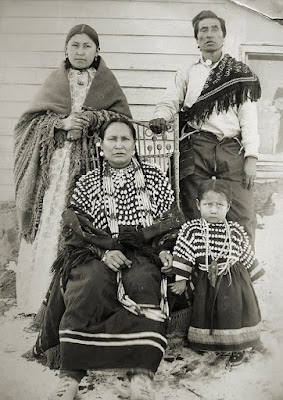I have written two blog posts about other branches of the Siouan Language groups, which you may read by clicking HERE, for Dhegihan and HERE, for Chiwere. Today, I will touch on the one that many of us initially recognize as coming from Siouan roots—the Dakotan.
If you are good with outlines, here is how the Western Siouan languages are related:
- Western Siouan languages can be divided into
- Missouri River languages: Crow, Hidatsa, and Mandan
- Mississippi River languages:
- Dakotan
- Chiwere-Winnebago
- Dhegihan languages
- Ohio Valley Siouan branches.
Why so many? The branches of the Siouan language all come from a common group of people who originally lived in the northeastern woodlands of North America. As their population grew, and/or they were pushed out of their traditional hunting grounds by other groups of Native Americans, and bands within their tribes broke away, these people eventually migrated to the regions around the Mississippi and Missouri Rivers.
Within the Dakotan language group, here is how it is organized:
- Western Siouan
- Mississippi Valley Siouan
- Dakotan
- Sioux
- Lakota (Teton, Teton Sioux)
- Dakota
- Eastern Dakota (Santee & Sisseton)
- Western Dakota (Yankton & Yanktonai)- misclassified as Nakota
- Assiniboine
That is a lot of “follow the yellow brick road” when it comes to seeing how the Sioux language and its dialects fit together.
 |
| Sioux family |
One should keep in mind, the Sioux language is the fifth largest language group spoken in North America. The only four language groups in North America that are larger are Navajo, Cree, the Inuit languages, and Ojibwa.
 |
| Assiniboine family |
The Assiniboine language (also known as Assiniboin, Hohe, or Nakota, Nakoda, Nakon or Nakona, or Stoney) is a Nakotan (Western Dakotan?) Siouan language of the Northern Plains. The name Assiniboine comes from the term Asiniibwaan, from Ojibwe, meaning "Stone Siouans". The reason they were called this was that Assiniboine people used heated stone to boil their food. In Canada, Assiniboine people are known as Stoney Indians, while they called themselves Nakota or Nakoda, meaning "allies".
You can see by a glance at the above map how much territory the speakers of Sioux and Assiniboine languages of the Dakotan language family covers. (The areas circled in orange. Their members are found in parts of Canada, including southern Manitoba and southern Saskatchewan. They are also found in the states of North Dakota, South Dakota, southern Minnesota, Northern Nebraska, and northeastern Montana.
 |
| Lakota people |
The Dakota and Lakota tribes were well-known tribes of the Great Plains. They were among those who fought long and hard against being forced onto reservations. They are often the tribes that appear in Western novels and romances.
What started my venture into the different branches of the Siouan language was my search for the origins of the Omaha Tribe, their language part of the Dhegihan language group, which was featured in my Thanksgiving romance, Bee Sting Cake by Brunhilde, which you can find by CLICKING HERE.
My other Thanksgiving romance, which takes place in Colorado, is Loving Lila. You will find the book description and link by CLICKING HERE.
I will not contribute to the blog again until after Thanksgiving, so I send my best wishes for a wonderful holiday.
Most of my information came from Wikipedia







Zina, you have done an amazing job researching the languages! You could combine your articles and publish them on Amazon for authors and those interested in American Indians. You've given us a wonderful resource with your blogs. Thank you, and Happy Thanksgiving.
ReplyDelete